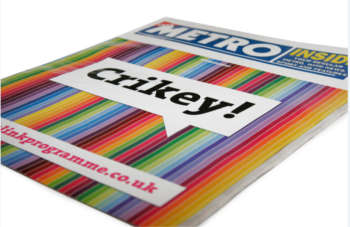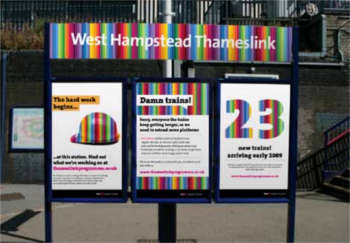As Twickenham gears up for the opening ceremony at the Rugby World Cup on Friday September 18, South West Trains has urged commuters, many of whom pay thousands of pounds a year for their season tickets, to take a holiday, walk or cycle to work. That was according to stories in the press, which reported how the train company’s actions had sparked outrage on social media.
Commuters were informed trains between Waterloo and Twickenham would be exceptionally busy throughout the afternoon and evening of the opening ceremony, but that this was an exceptional situation.

Heard the news? Evolve's campaign for Thameslink
London has been fortunate to host world class sporting events like the Rugby World Cup, but the additional strain on the transport network needs to be managed carefully. If we had any advice to offer South West Trains it would be to empathise with their customers, use straight talking and visual communications.
When there is transport disruption, caused by major events, extreme weather or infrastructure projects, operators often look to logistics and engineering as solutions, but they should not forget the crucial role of visual communications.
It is much easier for people to accept delays if transport operators explain to them when and how this will affect them, with language that empathises with how the resulting delays will impact on them. Disruption also needs to be communicated in language which is easy to understand. Messages must be considerate which helps to manage passenger expectations.
When we worked with First Capital Connect on Thameslink to improve travel to and across London in 2008, we devised an approach of empathy mixed with straight talking. We recognised the need to empathise with commuters’ frustrations over the major overhaul, which would take 12 years to complete, but also to highlight the positive benefits it would bring.
While in the long term the programme would improve customer journeys, reconciling that with many years of disruption was a tough message to make positive. These messages needed to be delivered in a distinctive way to grab the attention of passengers who are already bombarded with messages from all sides.
We looked at a number of expressions including anger and frustration to empathise with the client, and also punchy straight-talking body copy to inform customers of what was going on.

Evolve's eye catching adverts raised awareness
Visually, the striking and bright multi-coloured stripes, combined with an up-front human tone of voice created impact and recognition in cluttered, urban environments.
From the campaign launch in September to December 2008 commuter awareness levels of the improvement programme increased from 25% to 85%. By March 2009 they had reached 98%. Most importantly, customer feedback was positive despite the difficult messages.
Through communication that deploys empathetic but positive messages in a visually striking way it is possible to reduce passenger stress, aid traffic flow and keep London moving.
Across the whole system there are many little improvements that can be made, for example, visual and audible announcements that in a consistent, fun and friendly way encourage people to be considerate to others, move down carriages and, stand clear of doors, could make the whole system run more effectively.
By looking beyond logistics and engineering, and taking a more creative, considered approach to passenger communications, transport companies could improve passengers’ perceptions of the service they provide.
Jake Mason, CEO Evolve